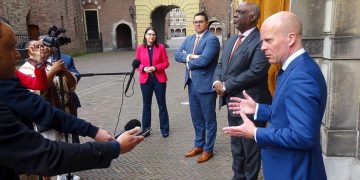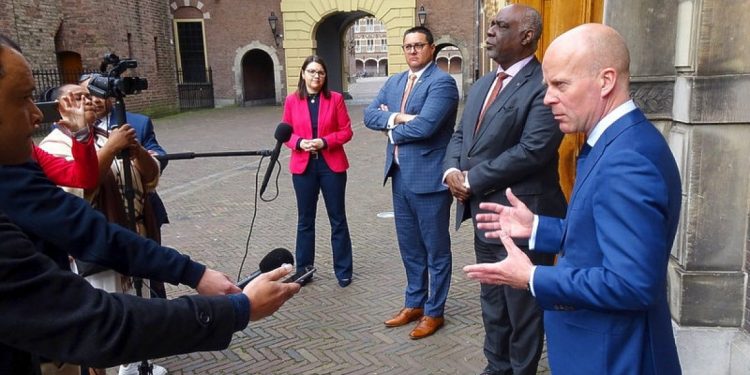THE HAGUE –Aruba, Curaçao and St. Maarten during the next six weeks will receive liquidity support from the Netherlands in the form of a zero-percent interest loan with no repayments for two years as immediate financial support to help the countries deal with the corona crisis. After the two years, it will be assessed how much the countries have to pay back and whether part of the loan can become a grant.
However, whether part of the loan becomes a grant or not depends on the extent with which the individual Dutch Caribbean countries will implement reform measures to lower their (personnel) expenditures, to have solid financial management, to increase tax revenues, to reform the pension system, and to invest in the right things which contribute to more resilience.
The Kingdom Council of Ministers on Thursday decided to provide budget support to Aruba, Curaçao and St. Maarten in the form of a two-year, zero interest loan, thereby following the advice of the Committee for Financial Supervision CFT for Curaçao and St. Maarten and the Committee Aruba Financial Supervision CAFT.
Curaçao will receive NAf. 105 million to cover April and NAf. 72 million for May. Aruba will get 42.8 million Aruban florins. St. Maarten will receive NAf. 50.2 million, the amount requested as liquidity support for 2019 liquidity, minus 3 million euros for the costs of housing St. Maarten detainees in Dutch prisons.
The amounts were much lower than the amounts requested by the countries: St. Maarten had asked for NAf. 245 million, Curaçao for NAf. 760 million and Aruba for Afl. 800 million. Dutch Minister of Home Affairs and Kingdom Relations Raymond Knops said after Thursday’s Kingdom Council of Ministers meeting that the amounts that were approved now served as acute assistance and that the long-term financing would be looked at subsequently.
“The liquidity support that has been approved today is the short-term story and is meant to compensate the acute needs of the countries. Aside from that, we are starting the trajectory to look at the long-term financing needs based on the individual plans of the countries which will be analysed by the CFT and CAFT,” Knops told the media after the meeting.
“We find it important that the funding becomes available for the countries right away. But it is also important that the countries will implement reform measures, because this crisis reconfirms the great vulnerability of the countries and we need to strengthen them so they are better able to deal with future crises,” said Knops.
“The countries also need to contribute. They have to do everything possible to secure a solid financial basis. It means making choices, taking politically difficult decisions, collecting taxes and investing in vital services like the social sector, public health and education. In a video-conferencing meeting with the Prime Ministers of the Kingdom last night, we agreed that we have to do this, to contemplate together how we can make changes to the system so the countries become less vulnerable,” said Knops, who pointed out that before the corona crisis, the Dutch Caribbean countries were already facing financial problems.
The Minister said that he saw the urgent needs of people in distress on the islands. “We are looking at ways to help them. This crisis hits the most vulnerable the hardest. We are in this Kingdom together and we will help each other.” He said that aside from medical assistance, the Dutch government also looked at the possibility of humanitarian aid.
Asked by the media what his opinion was on the 10 per cent salary cut of St. Maarten politicians, Knops said that even though this was a “sympathetic gesture,” much more was needed in this time of crisis.
He criticised the high salaries that have been and continue being paid to members of government, members of Parliament and directors of government owned companies on the islands. “Public officials need to serve the people, the country, and high salaries should not be part of that. The high salaries are unacceptable and it needs to stop. It is intolerable that people go hungry and that other get paid such high salaries for relatively small islands.”
Ministers Plenipotentiary Antony Begina of Curaçao, Guillfred Besaril of Aruba, and Director of the Cabinet of the St. Maarten Plenipotentiary Carol Voges were cautiously optimistic about what they called a “first step” to facilitate the acute needs of their governments to implement emergency measures to protect their economy and provide social assistance.
“We are content that St. Maarten will be receiving liquidity support and that we have complied with the preconditions, including a 10 per cent salary cut. We had hoped today on a decision regarding our proposed stimulus programme and emergency package, but this will now be handled at a next Kingdom Council of Ministers meeting,” said Voges.
The CFT still has to analyse the St. Maarten plan and to calculate the budgetary consequences. “But at least we can now take the first steps and alleviate the most urgent needs. We have already started the process to assist the people, for example with food baskets, and we will continue to work on that,” said Voges, who represented St. Maarten at Thursday’s meeting in absence of Minister Plenipotentiary René Violenes.
“We are satisfied with this solution, because we can now start tackling the urgent social needs of the Curaçao people. It is positive that there is an outlook for the longer term, financially, and that we will continue to discuss with each other how to proceed with this in the near future,” said Anthony Begina.
“At least it is a start. We have a compromise on how to continue working together on what is needed for the countries on the long term. It is a highly exceptional situation where together as a Kingdom we fight a battle against an invisible enemy,” said Besaril. The next Kingdom Council of Ministers meeting is on May 14.


















